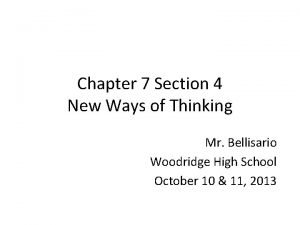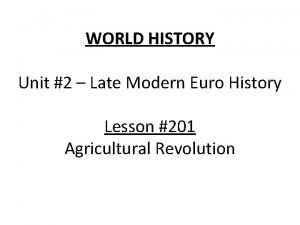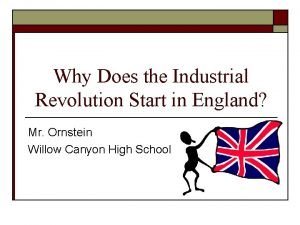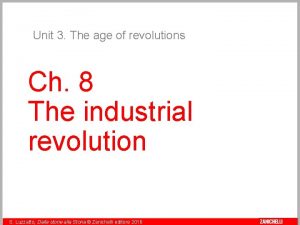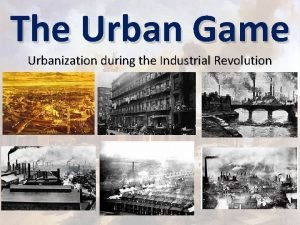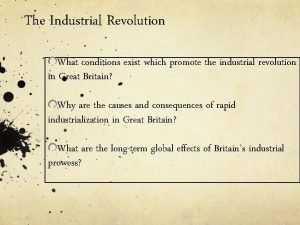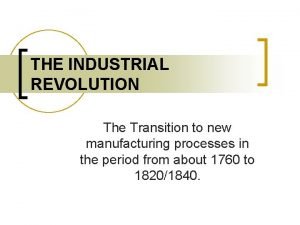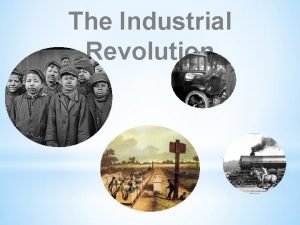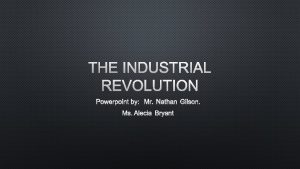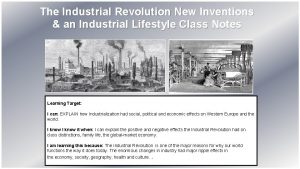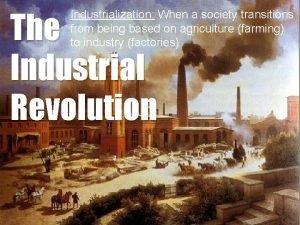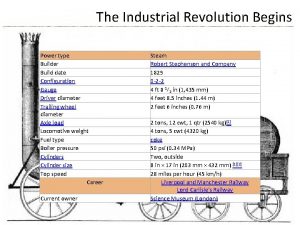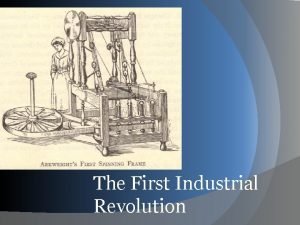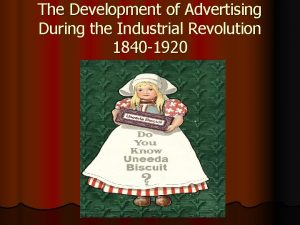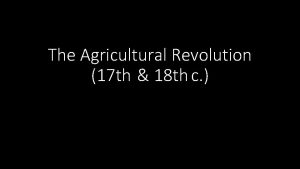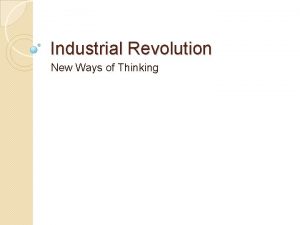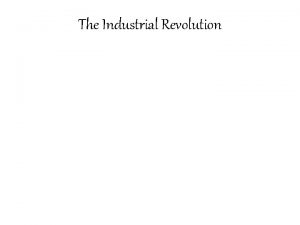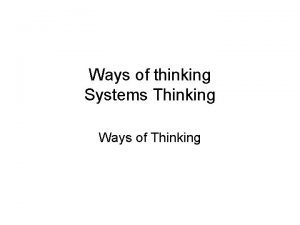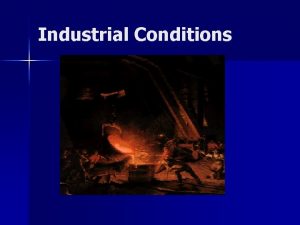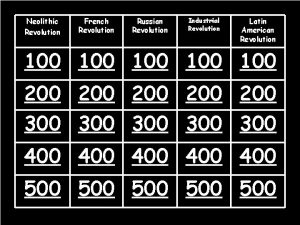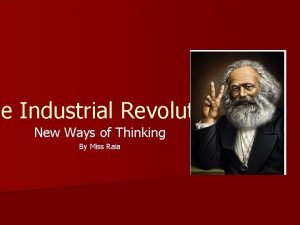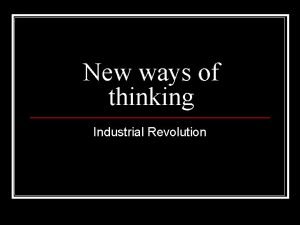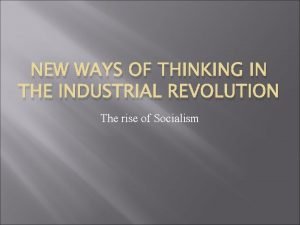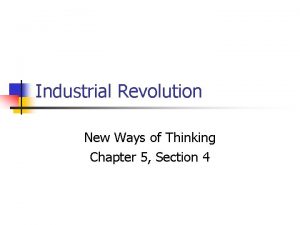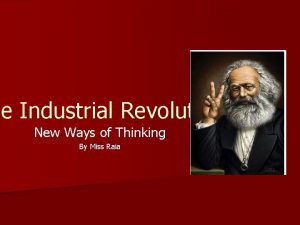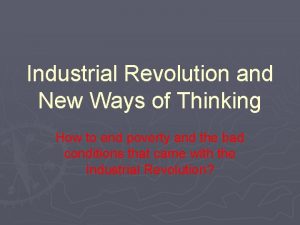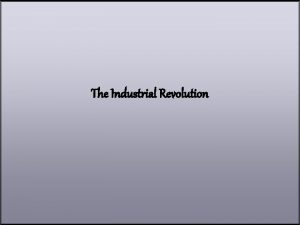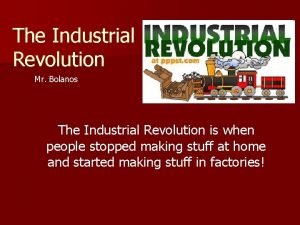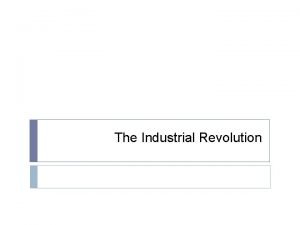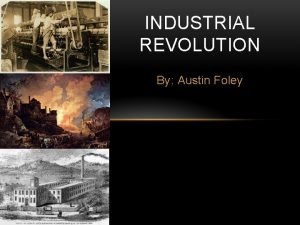Industrial Revolution New Ways of Thinking ReCap What




















- Slides: 20

Industrial Revolution New Ways of Thinking

Re-Cap What problems arose during the Industrial Revolution? The transition from agriculture to urban industry was … What was done because of this? ◦ Eventually people demanded better working conditions through: Labor unions = better hours and working conditions Child labor laws The right to vote (first men and then women)

New Ways of Thinking • As a result of a rapidly changing lifestyle, people turned to different ideas to help explain what was happening and untimely what should happen. • Where do you think these ideas came from?

New Ways of Thinking • The different ideas that became prevalent during the Industrial Revolution can be divided into two main categories. These are still debated today. 1. Laissez -Faire Economic Capitalism • 2. Socialism •

Laissez-Faire Economics Laissez-Faire is a French term that means “let do”, or “leave it [economy] alone” Laissez-Faire economists call for the government to keep its “hands-off” the economy Famous know: Laissez-Faire economists to Adam Smith (Father of Capitalism) Thomas Malthus (Population) David Ricardo (Iron Law of Wages)


Adam Smith - Father of Capitalism Believed that the unregulated exchange of goods and services would eventually help everyone A free market will allow for more goods at lower prices A growing economy encourages capitalists to invest in new business which creates jobs Pointed to the success of the Industrial Age - which had no/little government interference

Thomas Malthus on Population Believed population would outpace the food supply Believed that war, famine, and disease kept populations under control Urged families to have fewer children (especially the poor) ◦ Early on, people believed this but his predictions proved to be false. Food supplies grew even faster than population.

David Ricardo - Iron Law of Wages Also believed the poor had too many kids Believed in a cycle of poverty: ◦ When wages are high people have more children ◦ When there are more people to hire, wages go down ◦ When wages are lower, and there are too many people, unemployment is high

Utilitarianism A revision of Laissez-Faire economics Allowed for government interference in the economy Believed the goal of society should be to provide the greatest happiness (utility) to the greatest number of people Supported individual freedom (provided happiness) Supported government involvement to help the struggling middle class Called for giving the right to vote to working men and women Right to vote = suffrage

Socialism… People control production and distribution of goods and services.

The Socialists Allowed for government interference in the economy on three different levels 1. UTOPIAN SOCIALISM-peaceful, set up of communities which share work and profit, no vote by people 2. DEMOCRATIC SOCIALISM- people are informed of advantages, vote for this type of socialism, still in practice in West Germany, Sweden, Israel, and during part of the twentieth century in Great Britain. 3. SCIENTIFIC SOCIALISM-part of the system of communism this calls for violent revolution by the proletariat to defeat the capitalists. Today: All call for some or complete government ownership and control of business.

Utopian Valued the good of Socialism society over individual rights Believed capitalism created a divide between rich and poor Believed that instead of individual business controlling the means of production, society as a whole should Goal of socialism is to make society better off at the expense of freedoms

Robert Owen • Socialist AND business owner • Refused to use child labor • Campaigned for child labor laws and labor unions Owen set up a Utopia in New Lanark Scotland where he transformed life with ideas and opportunities which were at least a hundred years ahead of their time. Child labor and corporal punishment were abolished, and villagers were provided with decent homes, schools and evening classes, free health care, and affordable food.

Scientific Socialism - Karl Marx German philosopher that teamed with another socialist - Friedrich Engels to write the Communist Manifesto Believes that economics is the driving force in history A constant struggle between “haves” and “have-nots” Believed that the “haves” have always controlled society (called the bourgeoisie)

-The “have-nots” are called the proletariat and are the working and poor class -Hated capitalism because he believed it called for a few to be rich, while the rest were poor -Believed that in the end the proletariat would overthrow the bourgeoisie and create a communist (class-less) society where wealth is equally shared

Marx said that the workers would rise up and stab the owners with their pitchforks… Ok, so he didn’t say that, but he said that the continued divide between the haves and the have not's would end in a bloody revolution.

And that private property would cease to exist.

Name that economic philosopher of the late 1800 and your favorite biology teacher at CHS…

Communism like Marx discussed… We have never really seen in the world. Maybe China, Russia, and Cuba, but those didn’t look like what Marx talked about
 Chapter 7 section 4 new ways of thinking
Chapter 7 section 4 new ways of thinking Gods ways are not our ways
Gods ways are not our ways Vertical arrow technique
Vertical arrow technique Russian revolution vs french revolution
Russian revolution vs french revolution You should hope that this game will be over soon
You should hope that this game will be over soon Green revolution vs third agricultural revolution
Green revolution vs third agricultural revolution Enclosure movement industrial revolution
Enclosure movement industrial revolution Why did the industrial revolution start in britain
Why did the industrial revolution start in britain An age of revolutions zanichelli
An age of revolutions zanichelli Urbanization board game
Urbanization board game Enclosure movement industrial revolution
Enclosure movement industrial revolution Putting-out system
Putting-out system The transition to new manufacturing processes
The transition to new manufacturing processes Industrial revolution quiz
Industrial revolution quiz Nathan gilson
Nathan gilson Negative effects of industrial revolution
Negative effects of industrial revolution The factory
The factory Multistory building divided into crowded apartments
Multistory building divided into crowded apartments 1st industrial revolution
1st industrial revolution Industrial revolution advertisement
Industrial revolution advertisement Enclosure movement industrial revolution
Enclosure movement industrial revolution
